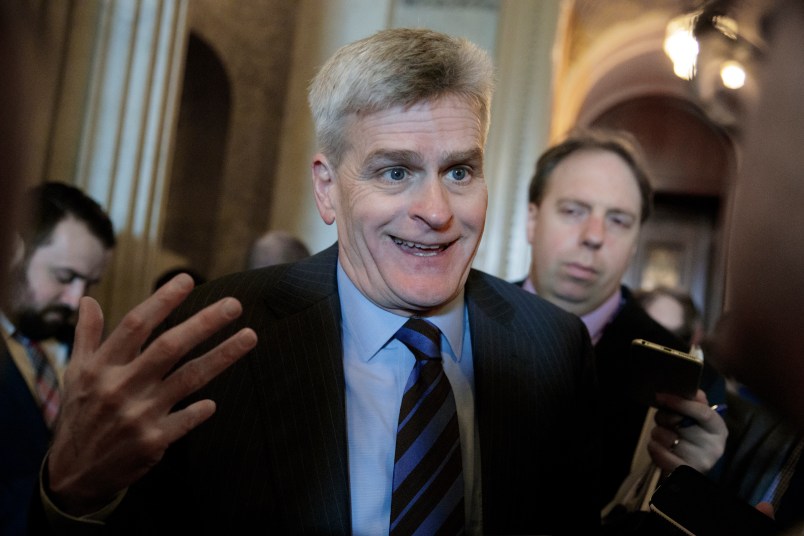Senate Republicans were mostly vague coming out of a series of health care meetings Tuesday, but at least one crucial Republican in GOP leaders’ efforts to get 50 votes for Obamacare repeal appeared to be warming up to the direction the internal talks were headed.
“I am very encouraged,” Sen. Bill Cassidy (R-LA), who has been one of the most vocal senators on health care policy, told reporters in between two of the GOP Senate gatherings.
Cassidy, a physician, has been a ringleader of sorts for Republican moderates skeptical of the GOP’s partisan Obamacare repeal approach. He co-authored his own Affordable Care Act replacement bill with Sen. Susan Collins (R-ME) that had been bashed by conservatives as “Obamacare-lite.” One of its key provisions, an auto-enrollment feature that would automatically put individual consumers on a bare-bones plan as a way of expanding the risk pool, is reportedly on the table in the broader conference-wide discussions.
“Of course, it’s not everything I want,” Cassidy said of the general talks, “but that’s life.”
In the weeks since the House approved a politically toxic Obamacare repeal that, according to the CBO, would deprive 23 million people of their health care coverage and impose $834 billion in cuts to Medicaid, Senate Republicans have hosted twice- or thrice-weekly health care policy meetings to hammer out their own Obamacare repeal bill. At Tuesday’s conference-wide lunch, rank-and-file was presented with a slideshow going over the proposals being looked at in the hopes that decisions can start being made and the text of a bill can be sent to the CBO, with some Republicans hopeful for a vote by next month.
“We talked more in terms of the goals. We’re still looking at those key goals and how to get there. There’s work to do,” Sen. John Hoeven (R-ND) told reporters after the lunch. “We haven’t gotten into the specifics yet.”
Sen. Roy Blunt (R-MO), a member of the leadership team, said the discussions were getting “progressively granular,” while Majority Leader Mitch McConnell (R-KY) refused the elaborate on the “component parts” of the proposals being looked at.
“We are getting close to having a proposal to whip and to take to the floor,” McConnell said at a press conference after the lunch.
The Senate’s efforts to dismantle the Affordable Care Act have been extremely opaque. There are no plans for committee hearings or going through a more regular process. Republicans are using the complicated procedural process known as reconciliation to avoid a Democratic filibuster. GOP senators shuffling in and out of closed door meetings have mostly been tight-lipped about what deals are being hashed out, and Tuesday was no exception.
“We had a really detailed discussion about what would be in a bill, the details of which I am not going to comment on today. I am thinking it through,” said Sen. John Kennedy (R-LA).
Cassidy was one of the few Republicans who went into the substance of the talks. He said that Republicans were contemplating an “accelerated stabilization fund with a lot of money put up front” to stabilize the individual market in a transition period, during which the insurer subsidies known as cost-sharing reduction payments would also be appropriated. (The subsidies are the target of a GOP lawsuit, which claims they are illegal because Congress didn’t appropriate them, and President Trump himself has threatened to halt them.)
Cassidy also said “states would have the opportunity of more aggressive waiver system in which they could adapt to their unique circumstance.”
“We get rid of the individual and employer mandates, which I think the American people want to do, and there’s a concerted thought about how to lower costs,” he said.
Sen. John Barrasso (R-WY), a physician and member of the GOP leadership team, confirmed that tweaks were being made to the House repeal bill’s phase-out of Medicaid expansion to make it more of a “glide path.” There were few details offered about any changes to how the House bill transformed the larger Medicaid program into a per a capita cap program, in which federal funding for the states was limited on a per enrollee basis.
Meanwhile, Axios reported that a waiver option is being considered to allow states to waive some, but not all, of the Obamacare insurer mandates that were waivable under the House bill. Unlike the House bill’s waiver scheme, the Senate approach being looked at would not allow states to permit insurers to charge people with pre-existing conditions more based on their health status.
The latest round of talks comes amid pessimism during last week’s congressional recess about whether the Senate GOP would be able to pass a repeal bill. While home, Sen. Richard Burr (R-NC) said that it was “unlikely that we’ll get a health-care deal” this year. On Monday evening Sen. Lindsey Graham (R-SC) told reporters he didn’t “think we can put it together among ourselves.”
Some aides and outside observers have even floated the possibility that McConnell would bring the bill up for a vote even if he did not have all the votes, pointing to the need to move on to tax reform and the must-pass issues, like the debt ceiling and funding the government, on Congress’ plate in the fall.
Asked Tuesday whether he would do that, McConnell said coyly, “We’ll let you know when we’re going to go to the floor.”







Or death, maybe, depending. It’s not like they care.
Great.
“Universal access” is now a garbage policy with a $10K deductible, a $50K cap, and countless exclusions.
CrapCare™ for everyone!
So much for windsock Lindsey.
Still ‘vaporware’?
Wasn’t it just 3/4 weeks ago this guy Cassidy was stating it didn’t pass the Jimmy Kimmel test?